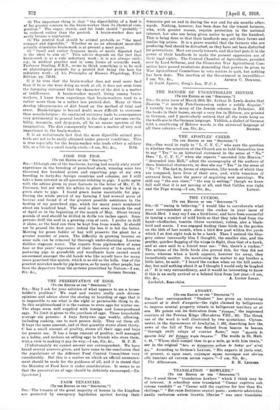ANGARY.
[To THE EDITOR OF THE " SPECTAT011."] Sig,—Your correspondent " Student " has given an interesting. account of le droit d'angarie—the right claimed by belligerents to impress neutral property situate in belligerent territory or at sea. He points out its derivation from "eyeapee" the impressed, couriers of the Persian Kings (Hereclotus VIII., 98). The Greek, use of the word is well illustrated by two quotations. Clytem- nestra in the Agamemnon of Aeschylus, I. 282, describing how, the news of the fall of Troy was flashed from beacon to beacon. "through swift relays of courier flame," says " stfpurids de. Opuerar derv' di-' dyrapav ryas tweurev." The words in St. Math. v. 41, "Whose shall compel thee to go a mile, go with him twain," are in the original "lien • es aryapeurret /seam Iv Ilwaye ACT' at TO; me." According to Grimm's Lexicon, "His angaris id juris erat, ut possent, si opus esset, cujusque equos navosque ant obvioe, sibi homines ad cnrsum seeum rapere."—I am, Sir, Asc.,


























 Previous page
Previous page